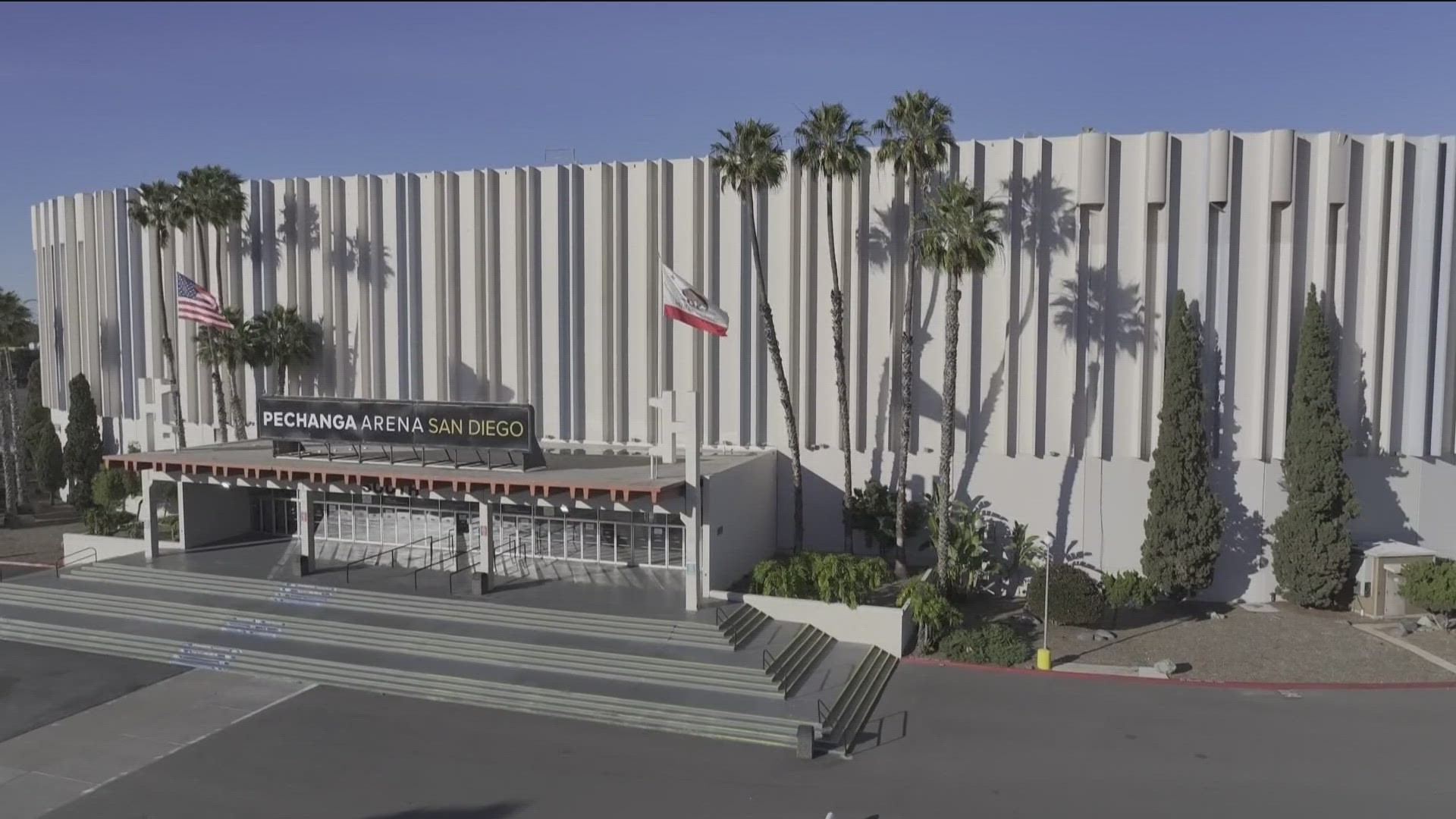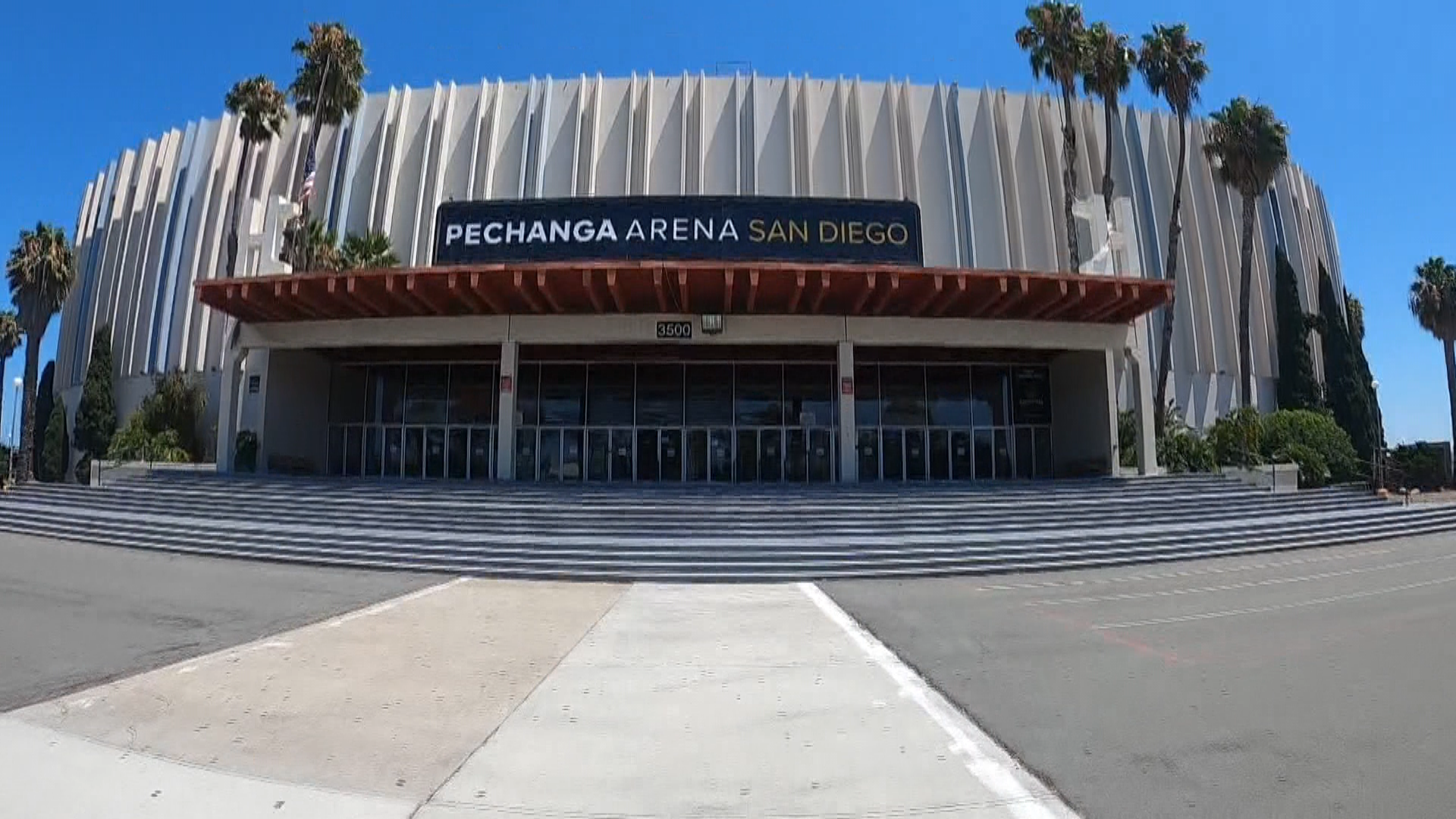SAN DIEGO — The future of San Diego's push to build a new sports arena is in flux after a new report recommended that the San Diego Sports Arena, built in 1966, be considered historic.
In an April 11 staff report to the city's Historical Resource Board, staff found the San Diego Sports Arena qualifies for all three historical designations and that demolition of the currently named Pechanga Arena will create "significant" historical impacts.
While the report finds that developers of the Midway Rising project, which looks to bring thousands of apartments, and retail stores as well as a new arena, could lessen the historical impacts by including historical photos of the current arena in the newly built arena. The demolition will not eliminate the impacts.
The looming historical designation is the latest obstacle in the development of a new sports arena as well as what the Midway Rising team has pitched as the largest affordable housing development in city history on the 48-plus acres surrounding the arena.
Since getting awarded exclusive negotiating rights with the city, Midway Rising has announced new investors, a reduction of affordable units, and concerns over a rising water table on the property. Now the team is confronted with a possible historical designation which could mean additional money for studies and reports.
Arena History
Constructed in 1966, the San Diego Sports Arena served as the home to what was then the Western Hockey League's San Diego Gulls franchise.
In 1967, the arena became the home court for the NBA's, San Diego Rockets, which later moved to Houston. Ten years later was home to the San Diego Clippers, which later moved to Los Angeles.
At the time, the city's Sports Arena and the presence of professional sports teams were said to boost San Diego's status as a major U.S. city.
“It was such an important part of San Diego's cultural history and cultural identity that it deserves to be recognized and documented,” said Bruce Coons from the Save Our Heritage Organization. "It was the place in the 60s, early 70s to go to for concerts. It put us on the map. On the world map. We practically got every concert that came through on tour and that's generally where you went - was there.”
Coons is among those who submitted input on the Sports Arena's historic resource designation. Coons doesn’t believe the project’s timeline. “It won't slow down the process. There are so many other things that they have to do alongside this. This one won't even rate as much of an issue.”
The staff report agrees that the arena was a big part of San Diego's status among U.S. cities when it was built.
"The construction of the International Sports Arena was part of a broader trend of Modern-style stadiums constructed throughout the country during the mid-twentieth century," reads the April 11 staff report to the historical board.
"Having a major league professional sports team was a status symbol in the 1960s and construction of the International Sports Arena helped San Diego stay on par with other major U.S. cities...In San Diego, the construction of the San Diego Stadium and International Sports Arena represented the economic development of San Diego during the 1960s and the City’s interest in expanding recreational venues."
On April 24, the San Diego Historical Resource Board will discuss the city staff's recommendation to designate the arena as historic.
The City's Response
While the historic designation may complicate matters for the development team as well as the push to bring a new arena and thousands of housing units, a city spokesperson said the designation does not "preclude" the plan from moving forward.
The spokesperson told CBS 8:
"The City's Land Development Code requires review of all properties that are 45 years old or older to determine if the building is historically significant and eligible for designation as a historic resource when a development permit is applied for. If the property is found to be eligible, it is forwarded to the City's Historical Resources Board (HRB) to consider designation. This process applies to City-owned properties as well. The applicant team has been aware of the process and has prepared the required technical evaluations, which the HRB will be reviewing at the April hearing. It is important to note that even if designated by the HRB, the designation does not preclude redevelopment of the site or demolition of the Sports Arena; it simply triggers a process to evaluate whether or not any feasible alternatives exist that could reduce impacts to the historic resource."


